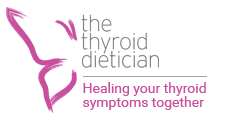Avoiding obvious culprits within the diet such as gluten and dairy when considering hypothyroidism is obvious to many already suffering with the condition. What is not obvious, however, is if goitrogenic foods such as broccoli, cauliflower, cabbage, and kale are good for thyroid health. It becomes confusing because the foods I just mentioned are rich sources of nutrition and yet many health care professionals tell patients to avoid these foods if they have hypothyroidism.
The theory behind avoiding foods like broccoli comes from the fact that they contain goitrogens which, in enough quantity, can hinder thyroid function by interfering with the enzyme thyroperoxidase or TPO. This enzyme is responsible for using iodine to create thyroid hormones. However, recent studies suggest that eating foods that contain goitrogens do not really affect thyroid function. (1)
There are several reasons for this:
- You need A LOT of goitrogens to hinder the thyroid. In order to understand how many goitrogens are needed to decrease thyroid function, I will give you some numbers. One needs 194mol of goitrogens to decrease uptake of iodine. A 100 gram serving of broccoli contains 10mol of goitrogen. This means that you would need to eat 2 or more kilos of broccoli per day every day to inhibit the thyroid. (1)
- Foods that contain goitrogens are also nutrient dense. Broccoli is known for its potential to boost the detoxification processes of the liver and can protect against cancer. Cabbage can be fermented to produce probiotics in the trillions range to support intestinal and immune health. Kale contains a powerhouse of nutrients that can enrich the blood with oxygen. In my opinion, there are more risks associated with NOT eating these foods than including them into your daily diet.
- How goitrogens affect you depends on other nutrient deficiencies. If you are deficient in iodine or selenium, eating foods that contain goitrogens CAN be detrimental to your thyroid. Selenium is a strong antioxidant that enhances thyroid hormone production as well as decreases oxidative damage to the thyroid. Iodine is a building block of thyroid hormones. If you are deficient in either, TPO (the enzyme mentioned earlier) can be inhibited.
- Goitrogens are destroyed by heat. Not sure if you have deficiencies? You can still enjoy many vegetables like kale or spinach simply by steaming or cooking them. Heat destroys goitrogens. If you want to include kale in your smoothie, quickly blanching it before you use it in your smoothie does the trick.
A Rich Diet means Nutrient Density
Overall, it’s important to look at the diet as a whole rather than avoid foods that have a lot of health benefits. It is very good for the diet to be diverse and to include different foods in order to ensure that you are getting all the nutrients you need in order to heal. For example, eating broccoli every single day and avoiding other vegetables is not a good idea. If for one week, you include broccoli, carrots, zucchini, and mushrooms into your diet, the next week change these vegetables and try foods like spinach, spaghetti squash, cabbage, and sweet potato.
Take home message:
- Foods that contain goitrogens do not necessarily decrease thyroid function.
- Foods like broccoli, cauliflower, spinach, kale, and cabbage all have anti-cancer properties and eating them is more beneficial than avoiding them.
- Goitrogens CAN hinder thyroid function in the presence of an iodine or selenium deficiency.
- Goitrogens are destroyed by cooking so you can enjoy a large range of foods that contain them.
- Eat a diet that is diverse in order to enhance the nutrients that are absorbed into your body for optimal health.
References:
Felker P, Bunch R,Leung AM. Concentrations of thiocyanate and goitrin in human plasma, their precursor concentrations in brassicavegetables, and associated potential risk for hypothyroidism. Nutr Rev. 2016 Apr;74(4):248-58. doi: 10.1093/nutrit/nuv110. Epub 2016 Mar 5.




